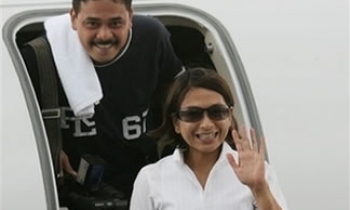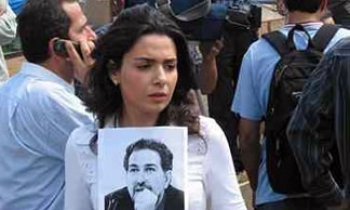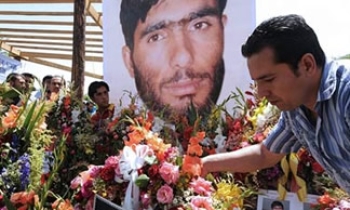In the days following the sexual attack on well-known CBS reporter Lara Logan in Egypt, the International News Safety Institute (INSI) assembled a safety advisory for women travellers. Meanwhile, the Committee to Protect Journalists (CPJ) laments the trouble with documenting sexual violence against journalists.
Logan, a reporter for the American TV cable network CBS, was attacked on February 11 while reporting on reactions in Cairo's Tahrir Square to Egyptian President Hosni Mubarak's resignation. CBS has confirmed that Logan was the victim of a brutal and sustained sexual assault and beating.
The news of the sexual assault against Logan hit CPJ especially hard - she is also a CPJ board member. Asked about what data they collect on sexual assault, CPJ says, "We have little on our site because sexual assault is not commonly reported to us—the data, therefore, is not available… We receive calls in which journalists report on risky conditions in particular cities or countries, sometimes telling us of their personal molestation or rape, and usually ask that we not share their private pain."
CPJ advocates for its concerns about sexual violence against journalists on a political level, and in some cases, it provides monetary assistance or referrals to psychological counsellors to journalists who have been victims of sexual violence. CPJ's journalist security handbook, currently being updated, will include a chapter on sexual assault.
INSI, meanwhile, has just released a safety advisory for women journalists, with a promise for a more substantial document in the coming months. "Sexual violation of female reporters is the last remaining taboo in the profession, like trauma used to be," said INSI board member Judith Matloff, who pioneered a study a few years back on this very issue. "At a time of shrinking foreign budgets, no one wants to be pulled off the job because they are seen as a liability."
The solution is to prepare women to deal with the unmentionable, rather than taking them off the job, says Matloff. INSI's guide echoes Matloff's suggestions. To name a few: defecate on yourself if attacked, keep an aerosol can by the bed (to spray into an assailant's eyes), don't drink alone with men, ensure you're not followed to your room, push furniture against hotel doors, try to work alongside a man in crowds, wear a whistle but never a ponytail.
INSI Safety Advisory for Female Journalists
GENERAL INFORMATION
- If travelling alone, choose a good standard hotel where security is of a higher standard than you might stay in if travelling with male colleagues.
- Try not to attract unwanted attention by striking up conversations or making eye contact with strangers. It can sometimes be misinterpreted as flirting.
- Unless you want to be the centre of attention, do not wear tight fitting or revealing clothes
- If you’re alone and facing unwanted attention, have a cover story prepared – ‘I am waiting for my husband/boyfriend/colleague to arrive’. If the pestering continues, try and join a large group of people – preferably mixed sex
- Don’t wear expensive jewellery, but do consider wearing a cheap ring on your wedding finger, even if you’re not married.
- Always remain alert.
- Consider taking a male colleague with you into potentially volatile situations.
- Do not wear a pony tail or necklace which can be easily grabbed.
- Wear a sturdy belt.
- Do not drink alcohol alone with men, particularly in the Middle East.
- Keep a copy of your passport and documents with you at all times and store the originals in a safe place.
- Carry a mobile phone with local emergency numbers saved. Do not keep this in your handbag, in case it is snatched.
- Be aware of discussing details of your work with people you do not know. It may sometimes be better to pretend to work in an alternative profession – ie. teaching.
TRAVELLING
- If travelling alone, always tell someone where you are going, how you plan on getting there and when you expect to be back. If you are meeting someone, leave a name and number for them with someone you trust.
BY FOOT
- Avoid walking alone by yourself, especially in poorly lit areas, quiet streets and alleyways
- If possible, try to walk close to groups of people. Be aware of who is around you.
- Walk confidently, with your head up, and as though you look like you know where you’re going.
- Arrange to meet people in well-lit and busy areas.
- Where possible avoid carrying handbags; but if it is necessary wear them across your body.
- If you suspect you are being followed, try to find a busy place: hotel, shop etc.
TAXIS
- Always use a reputable company – avoid unlicensed cars.
- Agree the cost before you leave if the taxi does not have a meter.
- If alone, try not to sit in the front of the taxi. If you are in the back and being troubled by the driver, you have two doors from which to exit - but remember some cabs have automatic locking when the car is moving.
BUSES
- Sit near the driver.
- Sit near a group of people.
- Avoid sitting upstairs.
- Sit in an aisle seat.
- If in trouble, sound the bell ring continuously.
TRAINS/METRO/TUBE
- Avoid darkly-lit stations.
- Avoid empty carriages.
- Keep your belongings with you all the time.
HOTELS/ACCOMMODATION
- Try to follow the advice above about choosing a good standard hotel if travelling alone, but if this is not possible, consider the following:
- Security – are there security guards at the reception/front gate?
- Check the security in your room – do the doors/windows lock?
- If there is a chain lock on the main door, use it.
- Move furniture in front of doors.
- If there is an adjoining door, make sure you lock it from your side.
- Lock all doors and windows from the inside when you’re in the room and the outside when you leave – even if it is only for a couple of minutes.
- If on the ground floor, check to see if there are bars over the window. But be certain to locate an alternative escape route in the event of fire.
- Don’t take hotel rooms with easily accessible windows or balconies.
PERSONAL ATTACK
- Consider carrying a personal attack alarm. If using one when outside, carry it in your hand for quick use – not in your bag. But do not just rely on the alarm, shout too.
- Consider a rape whistle.
- Buy a door alarm for use in hotels.
- Keep a can of hairspray or deodorant with you to spray in the face of an attacker if needed – in your bag or by your bed.
- If attacked, try to vomit, defecate or urinate on yourself.
- Tell the attacker you are menstruating, are HIV positive or pregnant.










